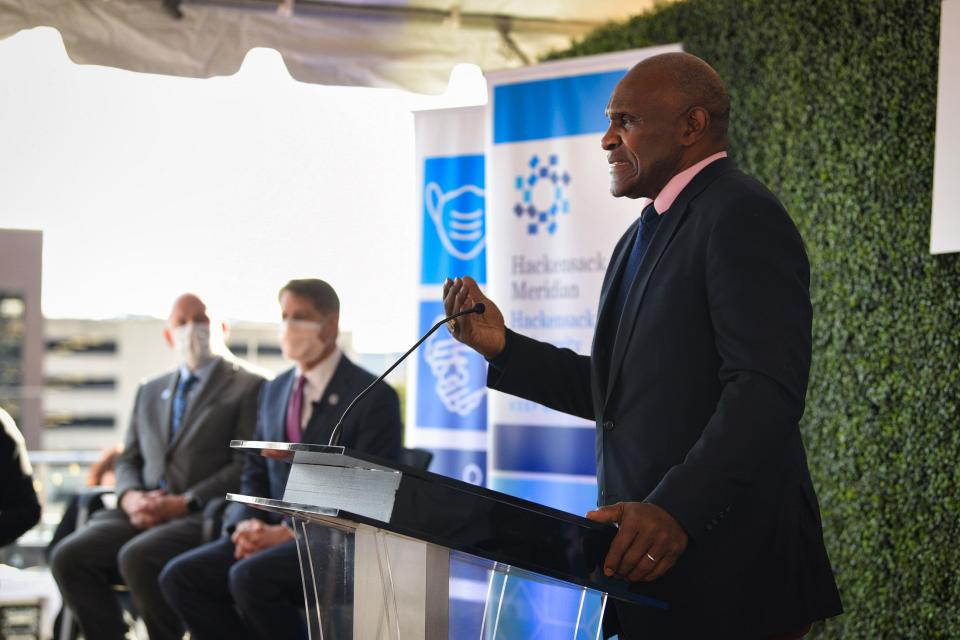Black men need a game plan when it comes to prostate cancer screening | Opinion
When I played football in college and then as a pro for the New York Giants, I learned early in my playing career that good health was sometimes the difference between winning and losing, succeeding and failing. Throughout my 17-year college and professional playing careers, I’ve seen all kinds of injuries that derailed many other players’ dreams. With that knowledge I recognized that good health is a commodity we have that we don’t truly appreciate until it’s gone. I have always thought about my health beyond just staying strong to play well to help my teams win game. My teammates and I were young, strong and physically healthy.
Back in the day when we were in our 20s and 30s, cancer was not very high on our list of concerns. At that stage in our lives, we were not overly concerned about getting cancer or getting screened for cancer. We were trained, in essence, to be warriors and to stay tough. But the truth is all men are vulnerable and are at risk for prostate and other cancers.
Here are the stats: 13 out of every 100 American men will get prostate cancer during their lifetime, and 2 to 3 of those men will die from prostate cancer.
Early prostate cancer does not typically cause symptoms; a man won’t know whether he has early prostate cancer without a screening test and other diagnostics.

After I retired from football and I was in my mid-30s, my personal physician suggested I begin to think about having prostate health screenings as I approached my 40s. I was totally on board with that and decided to not wait until I was 40. Instead I began getting screened at age 37. I have been having screenings on a yearly basis as a part of my annual physical examinations ever since. So far, I am healthy, but not every man has the experience or circumstances that I have had for many reasons. Because I am a Black man who is over 50, I am at a greater risk for prostate cancer than a younger white man. The good news is that if you catch prostate cancer early, it’s very treatable,so it's important to overcome any obstacles you may face and plan to screen early. In fact, I’ve made it my personal mission to spread the word about why it’s important for all men — and especially Black men — to have a game plan for prostate health.
More perspective:September is Prostate Cancer Month — it's time to get screened. Here's why
This Saturday, Oct. 1, I am working with the Hackensack Meridian Center for Discovery and Innovation, the Hackensack University Medical Center Department of Urology and the Hackensack Meridian Health Community Outreach Division on a men’s health screening day at the Hackensack Civic Center in Hackensack.
At this event you can get screenings for prostate cancer, high blood pressure, diabetes and other diseases. Updates on cancer screenings will be provided, and I will be there to offer some remarks about why it’s so important to have health screenings. You can register for the event at events.hackensackmeridianhealth.org/menshealth or call 1-800-560-9990.
The most common risk factor for prostate cancer is age, and the older men get, the greater likelihood they will get prostate cancer. And you are at a greater risk if you are African American or have a family history of prostate cancer.
This higher risk of prostate cancer in African American men is due to a range of factors, including genetics, socioeconomic status and disparities in the health care system, including lack of access to health care and physicians who are not skilled at culturally appropriate communication. Social determinants of health, such as economic instability, food insecurity, transportation issues and poverty also play a role.
The current American Cancer Society guidelines recommend that men at high-risk — men who have a family history, and Black men — should begin early detection with the prostate-specific antigen blood test and a digital rectal examination at 45 years of age. Furthermore, ACS guidelines suggest that the decision for high-risk men to be tested should be made within the doctor/patient relationship so that the benefits and any risks can be discussed fully.
Many of the barriers to screening are personal. Men in general are less likely than women to seek seek assistance when health problems arise. And in my experience, Black men are less likely to seek care and participate in health-related activities. This is due perhaps to cultural stoicism passed on from generation to generation — “We are strong and healthy and don’t bother with going to the doctor” — and distrust in the medical community, based on unethical government research, long since halted, that was conducted many years ago.
My advice for all men, and Black men in particular, is to discuss the risks and benefits of screening for prostate cancer with a doctor who understands your specific needs. If you don’t have a primary care doctor, find your local community health clinic or call the nearest city or university-affiliated hospital to find out what health screening services they offer.
It’s so important to get screened. And for Black men in particular, it’s vitally important to have a game plan to screen for prostate cancer as soon as you hit your mid 40s.
Harry Carson is a former American football linebacker who played his entire professional career for the New York Giants in the National Football League. He was inducted into the College Football Hall of Fame in 2002 and the Pro Football Hall of Fame in 2006. Carson is a health advocate who writes and speaks about the importance of health screenings and equity in health care.
This article originally appeared on NorthJersey.com: Black men need a game plan for prostate cancer screenings

